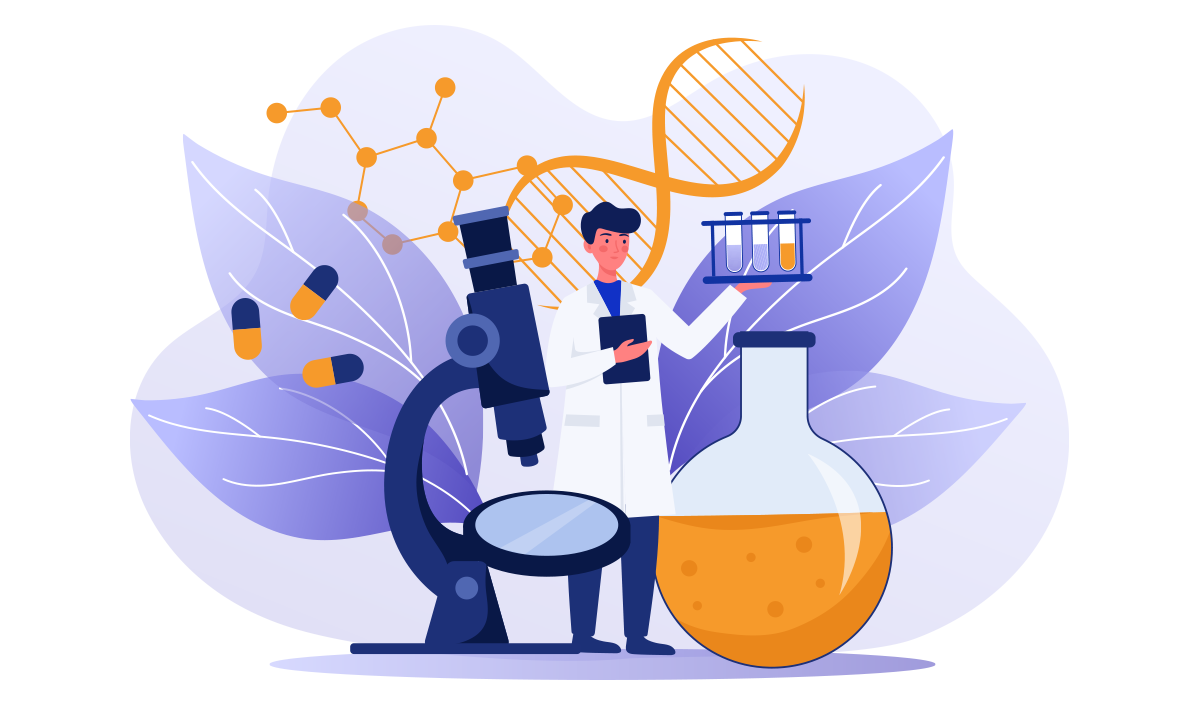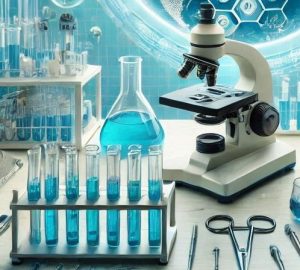This Course Structure is Curated as per the NEP-2020 Guidelines
Course Overview
B.Sc. Molecular Medicine & Stem Cell Technology program at Malla Reddy Vishwavidyapeeth, Hyderabad, is an undergraduate program designed to provide a comprehensive understanding of the molecular and cellular processes that form the basis of biological systems.
This program focuses on equipping students with the theoretical knowledge and hands-on skills from 1st semester itself. The curriculum covers advanced topics such as genetics, biochemistry, cell signaling, molecular biology techniques, and bioinformatics. Students gain hands-on experience in laboratory techniques, including PCR, electrophoresis, and cell culture, preparing them for cutting-edge research and practical applications in biotechnology and healthcare.
Graduates of this program emerge as ‘Skilled Molecular Medicine & Stem Cell Technologist’, enabling them to pursue further higher studies & do research in Molecular Medicine & Stem Cell Technology along with plenty of job opportunities globally.

Course Details
Description: 4 Years Degree Program
No. of Seats: 40
No. of Credits: 160 minimum & as specified
- Eligibility
- Curriculum Structure
- Program Outcomes
- Career Enhancement
- Higher Studies
- Job Roles & Progression
Intermediate BiPC, 10+2 or equivalent
| Semester | Name of the Subject |
|---|---|
| Semester 1 |
English Basic Chemistry Biochemistry Cell Biology and Genetics Basics of Computers Basic Chemistry Lab Biochemistry Lab Cell Biology Lab Interpersonal Communication |
| Semester 2 |
English Basics of Molecular Biology Biophysics Microbiology Biostatistics Molecular Biology Lab Microbiology Lab Stress Management |
| Semester 3 |
Ontogenetic Biology Immunobiology Computational Biology Oncobiology Fundamentals of Proteomics Immunobiology Lab Computational Biology Lab Ethics and Research Methodology Soft Skills Development |
| Semester 4 |
Biomedical Physiology Metabolic Dysregulation in Disease Stem Cell Biology Pathoproteomics Biological Techniques Mammalian Cell/Stem Cell Culture Lab Biological Techniques Lab Intellectual Property Rights Health and Well-being |
| Semester 5 |
Genomic Medicine and Tailored Healthcare Tissue Engineering Artificial Intelligence in Molecular Medicine Fundamentals of Pathology Elective (a) Stem Cell Therapy (b) Cell Based Disease Modelling Artificial Intelligence Lab Environmental Awareness |
| Semester 6 |
Essentials of Pharmacology Laboratory Techniques in Stem Cell Research Immunotherapy Scientific Writing Project Elective: (a) Structure-Function Relationship in Proteins (b) Genetic Engineering Art of Being a Better Person |
| Semester 7 |
Molecular Diagnostics Targeted Therapy Biosafety Dissertation / Project 1 Healthy Eating for Healthy Living |
| Semester 8 |
Animal Models in Biomedical Research Professionalism in the Workplace Dissertation / Project 2 |
- Cellular and Molecular Techniques: Skills in techniques like PCR, electrophoresis, sequencing, and CRISPR gene editing.
- Genomics and Proteomics: Expertise in analyzing genomic and proteomic data to understand biological systems.
- Immunology and Cell Signaling: Knowledge in immune system functioning and cellular communication mechanisms.
- Genetic Engineering: Proficiency in manipulating DNA and RNA for research or therapeutic purposes.
- Bioinformatics and Data Analysis: Skills in computational tools and software for analyzing biological data.
- Research and Lab Management: Competence in planning experiments, managing labs, and ensuring compliance.
- Certification in Genomics and Proteomics: Advanced training in analyzing genetic and protein data for research or clinical applications.
- Advanced Molecular Techniques Certification: Covers specialized techniques like CRISPR, NGS, and flow cytometry.
- Cancer Biology and Therapeutics Certification: Focuses on molecular mechanisms of cancer and potential therapies.
- Bioinformatics and Computational Biology Certification: Provides skills in analyzing biological datasets using computational tools.
- Stem Cell and Regenerative Medicine Certification: Explores applications of stem cells in medical and therapeutic research.
- M.Sc. in Molecular Biology or Genetics
- Postgraduate Diploma in Biotechnology
- Master’s in Bioinformatics or Computational Biology
- Ph.D. in Molecular Biology or Cellular Biology
| Duration | Roles and Responsibilities | Salary Range |
| 0-3 years | Lab Technician, Research Assistant | ₹4,50,000 – ₹6,50,000 per annum |
| 3-5 years | Molecular Biologist, Genetic Analyst | ₹6,50,000 – ₹9,00,000 per annum |
| 5-10 years | Senior Research Scientist, Lab Manager | ₹9,00,000 – ₹12,00,000 per annum |
| 10+ years | Director of Molecular Research, Biotechnology Consultant | ₹12,00,000+ per annum |

Fee Structure Per Academic Year - 2025
| Tuition Fee | Miscellaneous Fee | Scholarship | |||
| 125000 ₹ | 15000 ₹ | Above 95% – 125000 ₹ | Above 91% – 62500 ₹ | Between 81-90% – 12500 ₹ | Between 71-80% – 6250 ₹ |
| Tuition Fee | Miscellaneous Fee | Scholarship | ||
| 125000 ₹ | 10000 ₹ | Above 90% – 25000 ₹ | Between 80-90% – 12500 ₹ | Between 70-80% – 6250 ₹ |




